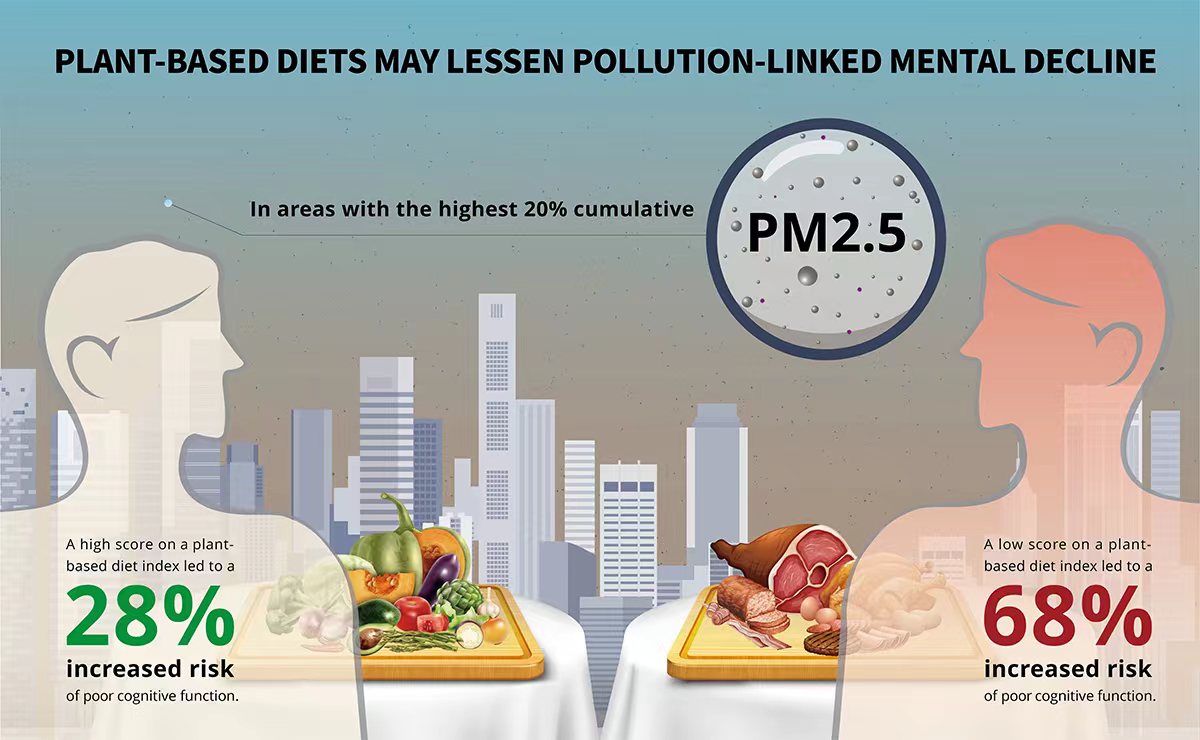Could promoting plant-based diets help protect against air quality-related cognitive decline?
Research is increasingly showing an association between air pollution and cognitive decline. So, how can we reduce the risks of ubiquitous dirty air on our brain? A new study has found that a plant-based diet may mitigate the detrimental impacts of fine particulate pollution (PM2.5) on cognitive function in older adults.
“We are on the cusp of establishing a causal role for air pollution on cognitive impairment and dementia, based on mounting evidence linking neurodegeneration with dirty air,” says John Ji, the principal investigator of the study published in The Lancet Regional Health – Western Pacific, and an associate professor at the Vanke School of Public Health at Tsinghua University.

Dr. John S. Ji from Tsinghua University has found plant-based diets may modify the negative effects of air pollution on cognitive decline.
The study followed 6,525 participants in China aged between 65 and 110 years for several years , all of whom had normal cognition at baseline. It found that those living in areas with the highest quintile of cumulative PM2.5 levels in the study areas had a 46% increased risk of developing poor cognitive function compared to those living in areas with the lowest cumulative PM2.5 levels. The authors also found that those who consume a more plant-based diet experienced harmful health impacts from air pollution than those who consume fewer plants. A high score on a plant-based diet index attenuated the impact of living in high air pollution from 68% to 28% in the risk of developing poor cognitive function over time.
Evolving research now focuses on the molecular mechanisms, indicating air pollution may cause inflammation in the brain by dysregulating the activation of brain-based immune cells called microglia, or by indirectly affecting the brain via the bloodstream after entering the lungs, explains Ji.
“Once cognitive decline begins, we rarely can see a reversal, but we believe there may be anti-inflammatory factors at play on the biomolecular level that can slow down the decline in people who engage in a healthy aging lifestyle, such as ensuring the intake of plant-based diets,” he adds.
Dealing with dementia
According to some figures, the number of people with dementia globally will be in the hundreds of millions in the next few decades, putting huge pressure on healthcare systems and social structures. In 2021, 10% of the global population will be 65 years or older, compared to a mere 5% in 1960. In China, the population aged 65 and above is currently 12% and rising. Currently, the percentage of people that are 65 and over in Japan is 29%, in Germany it is 22% and in the United States it is 17%.
Ji argues that there is a need for global research collaborations on effective means to prevent neurodegeneration, given these demographic shifts.
One way to tackle this, he says, could be to focus on trying to prevent Alzheimer’s disease and dementia more widely by first preventing mild cognitive impairment.
A 2020 Lancet Commission on Dementia identified 12 risk factors that can have an effect on cognitive decline: poor education in early life, hearing loss, hypertension, obesity, excessive alcohol intake, head injuries, smoking, depression, social isolation, physical inactivity, diabetes and air pollution later in life.
Air pollution is a vital issue for the local and national policymakers in China, notes Ji. And while emissions from fossil fuel combustion have been decreasing steadily in the country due to strict regulations implemented in 2013 following a particularly severe spate of air-pollution related health problems, “there is still a long way to go to meet World Health Organization air quality guidelines,” he says.

Dr. John S. Ji is an associate professor at Tsinghua University’s Vanke School of Public Health.
Ji is optimistic about positive change in the meantime through a combination of personal and systemic adjustments. “Individuals should work hard to live a brain-healthy life, and policymakers should realize that they can have a huge impact on the health of communities through their ability to affect pollution,” he says.
Reference
Zhu, A., Chen, H., Shen, J., Wang, X. et al. Interaction between plant-based dietary pattern and air pollution on cognitive function: a prospective cohort analysis of Chinese older adults. The Lancet Regional Health — Western Pacific 20, 100372 (2022) doi: 10.1016/j. lanwpc.2021.100372
Editor:Guo Lili